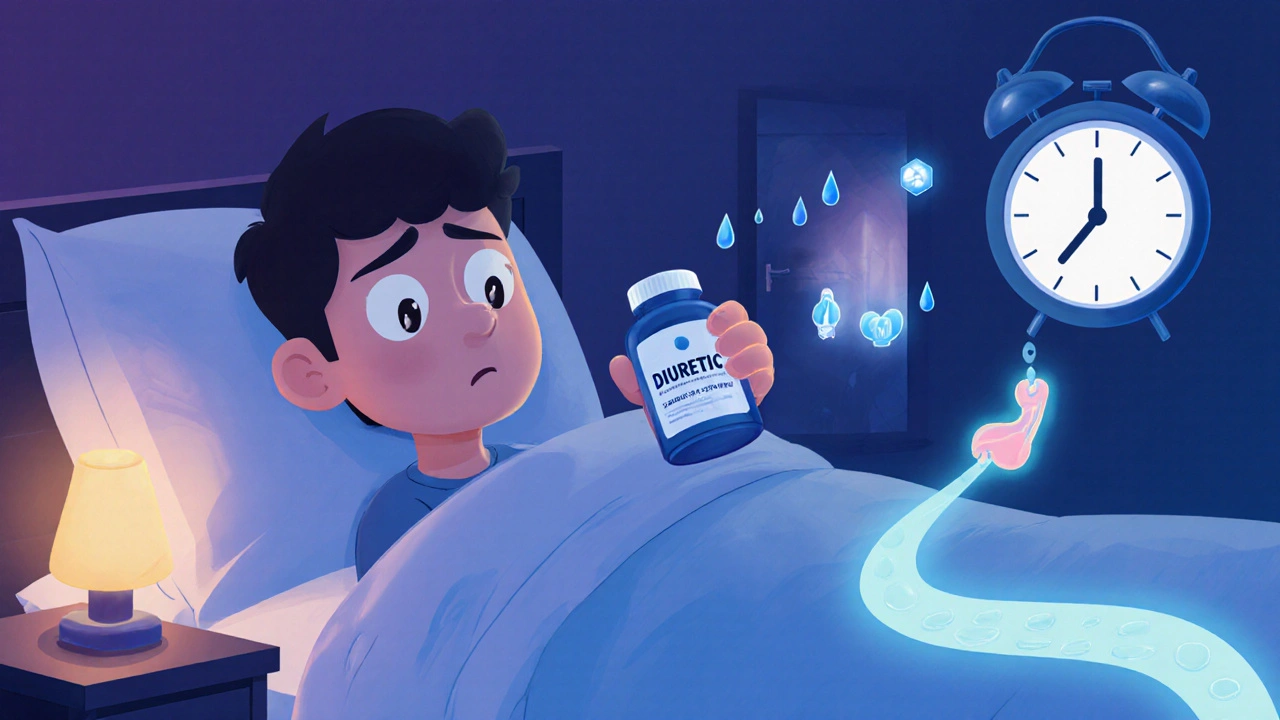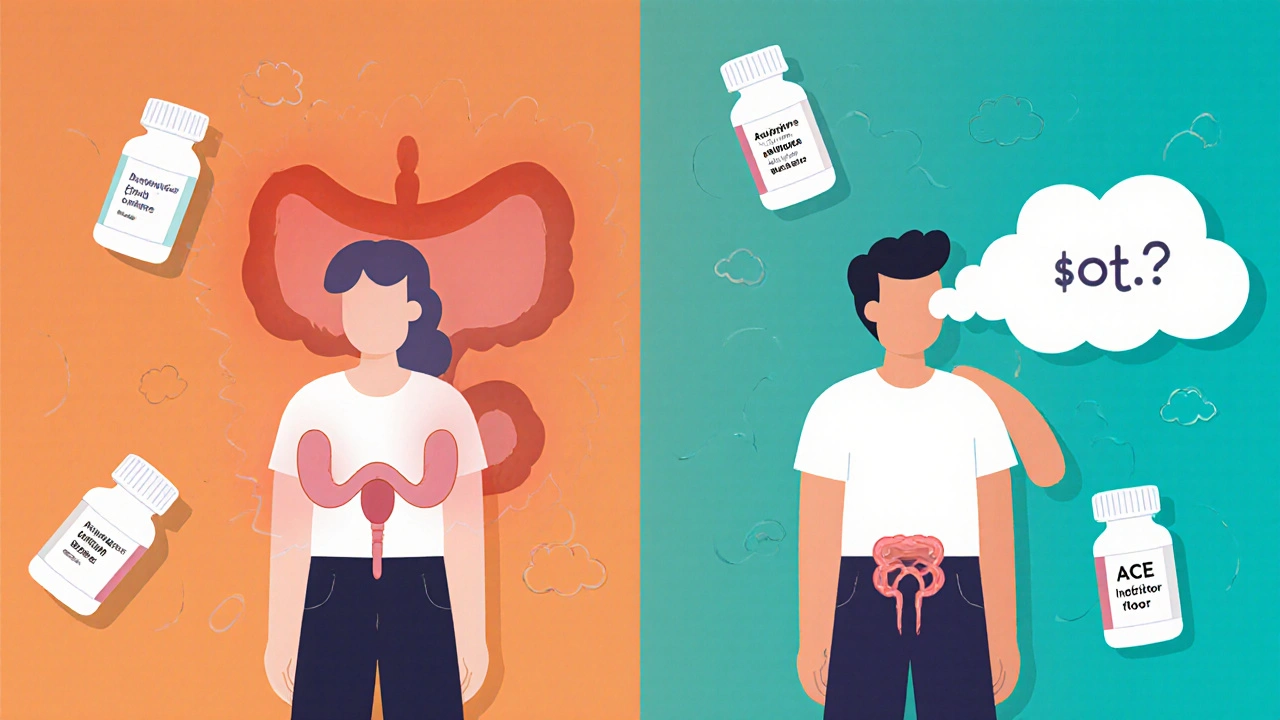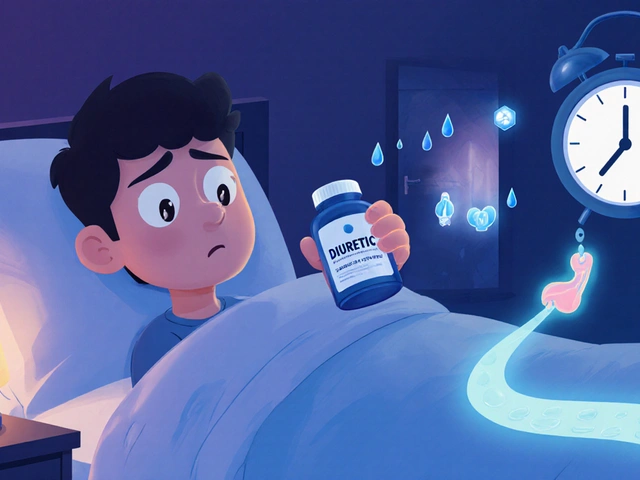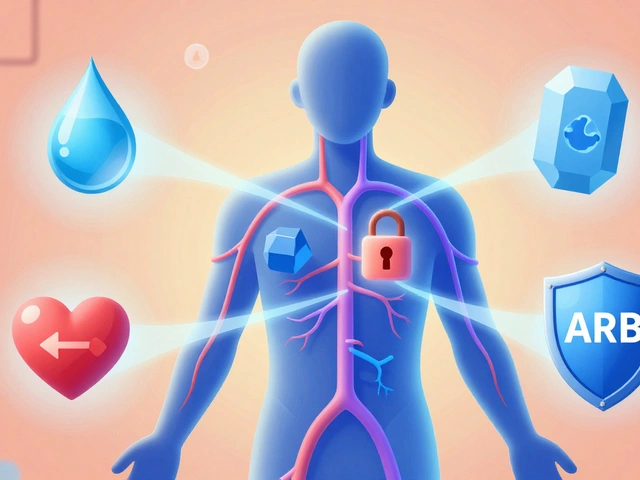Frequent Urination and Urgency from Medications: Common Bladder Side Effects

Medication Side Effect Calculator
Medication Side Effect Calculator
Enter the medications you're currently taking to estimate the likelihood of bladder-related side effects and get practical management advice.
Your Results
Recommended Actions
Waking up three times a night to pee? Feeling a sudden, sharp urge to go right after drinking water? You might blame aging, coffee, or stress-but what if it’s your medication? Many people don’t realize that common prescriptions can directly mess with bladder control. Frequent urination and urinary urgency aren’t just annoyances; they’re well-documented side effects tied to specific drugs, and they affect millions of adults-especially those on multiple prescriptions.
Diuretics: The Top Culprit
Diuretics, often called water pills, are the most common cause of frequent urination. Drugs like hydrochlorothiazide, furosemide (Lasix), and spironolactone (Aldactone) work by making your kidneys dump more fluid into your urine. That’s the point-they help lower blood pressure or reduce swelling. But that extra fluid doesn’t just disappear. It fills your bladder faster and more often.
Studies show that about 65% of people taking diuretics notice they’re going to the bathroom more during the day. Around 40% wake up at night to urinate. The higher the dose, the worse it gets. One 2021 study found that patients on 80mg of furosemide daily had nearly four times the risk of needing incontinence products compared to those on 20-40mg. The effect kicks in fast-within two hours of taking the pill.
The fix? Timing matters. Taking your diuretic before 2 p.m. cuts nighttime bathroom trips by about 60%. That simple change helps many people sleep through the night without ditching the medication.
Calcium Channel Blockers: Silent Bladder Interrupters
If you’re on a blood pressure pill like amlodipine, nifedipine, or verapamil, your bladder might be paying the price. These drugs relax blood vessels to lower pressure, but they also interfere with the smooth muscle in your bladder wall. That muscle needs calcium to contract properly and empty the bladder. When it’s blocked, your bladder doesn’t empty fully, and the stretched walls send false urgency signals.
Research shows verapamil carries the highest risk-up to 42% of users report increased nighttime urination. On average, people on nifedipine void 1.8 more times per night than those not taking it. Symptoms usually start within two to four weeks of beginning the drug. Many patients assume it’s just aging, but it’s the medication. Switching to a different class of blood pressure medicine, like an ACE inhibitor, can help without sacrificing control.
Antidepressants and Mood Stabilizers: When Your Mind Affects Your Bladder
Antidepressants like venlafaxine, fluoxetine, and paroxetine can worsen overactive bladder symptoms in about 22% of users. They don’t always cause more urine-they make the bladder hypersensitive. Even small amounts of urine trigger a strong urge to go.
Lithium, used for bipolar disorder, has a unique and serious effect. About 1% of long-term users develop nephrogenic diabetes insipidus. This means their kidneys can’t concentrate urine, leading to massive output-sometimes over 3 liters a day. That’s double the normal amount. In one study of 873 patients, 9% stopped lithium because of urinary problems. If you’re on lithium and suddenly peeing nonstop, get your kidney function checked.
Antipsychotics like clozapine, risperidone, and olanzapine also cause issues. They block acetylcholine, a key signal for bladder contraction. The result? Urinary retention, overflow incontinence, and a constant feeling of fullness-even when the bladder isn’t full.

Antihistamines, ACE Inhibitors, and Other Surprises
Benadryl and other antihistamines are often taken for allergies or sleep. But they relax the bladder muscle, which can lead to incomplete emptying. That doesn’t mean you pee more-you just can’t fully empty, which leads to dribbling and frequent trips. About 5-7% of users experience this.
ACE inhibitors like captopril cause coughing in about 15% of users. That persistent cough puts pressure on the pelvic floor and can trigger stress incontinence. You might not realize the cough is the real problem. Switching to an ARB (like losartan) often fixes both the cough and the leaks.
Alpha-blockers like tamsulosin (Flomax) are used to treat enlarged prostates. They help men urinate easier-but they cause retrograde ejaculation in 25-30% of cases. Semen goes backward into the bladder instead of out the penis. It’s not harmful, but it can be distressing. Many men don’t report it because they’re embarrassed.
What You Can Do: Practical Steps to Regain Control
Don’t stop your meds without talking to your doctor. But do take action. Here’s what works:
- Time your doses. Take diuretics and other bladder-irritating meds before 2 p.m. to avoid nighttime disruptions.
- Bladder training. Delay urination by 10-15 minutes when you feel the urge. Do this daily for 6-8 weeks. Studies show it reduces urgency episodes by 70%.
- Pelvic floor exercises. Kegels strengthen the muscles that hold urine in. Combine them with timed voiding, and incontinence drops by 55%.
- Track your symptoms. Keep a bladder diary for a week: note what you drank, when you peed, and how strong the urge was. Bring it to your doctor. It’s the best way to prove the pattern.
Many patients say their doctors never ask about bladder symptoms. In one Reddit survey, 42% of users had to push back before their meds were reviewed. Be proactive. Say: “I started these pills in June, and since then, I’ve been going to the bathroom constantly. Could this be related?”
When to Ask for a Medication Swap
Not all meds are equal. For example:
- If you’re on a diuretic and it’s causing major disruption, ask about a lower dose or a different type.
- If you’re on a calcium channel blocker and waking up 4+ times a night, ask if an ARB or beta-blocker could work instead.
- If you’re on lithium and peeing constantly, your doctor might check your kidney function and consider alternatives like valproate or lamotrigine.
- If you’re on an anticholinergic antidepressant, SSRIs like sertraline may have fewer bladder effects.
The Mayo Clinic recommends a four-step process: 1) Confirm symptoms started within 2-8 weeks of starting the drug. 2) Rule out infection or prostate issues with a urine test and bladder scan. 3) Try timing and behavioral changes. 4) Only then consider switching meds.
What’s Next? Research Is Catching Up
Scientists are now looking at why some people are more affected than others. Early data from the National Institute of Diabetes and Digestive and Kidney Diseases suggests a genetic link. People with a specific variant in the CHRM3 gene are 3.2 times more likely to have bladder issues from anticholinergic drugs. This could one day lead to genetic screening before prescribing.
For now, the message is clear: frequent urination isn’t always normal. If it started after a new medication, it’s probably related. You don’t have to live with it. Talk to your doctor. Track your symptoms. Ask about alternatives. Your bladder-and your sleep-will thank you.
Can medications really cause frequent urination?
Yes. Many common medications, including diuretics, calcium channel blockers, antidepressants, and antihistamines, can directly affect bladder function. They either increase urine production, reduce bladder control, or make the bladder overly sensitive. Up to 20% of adult urinary symptoms are linked to medications.
Which medications are most likely to cause urinary urgency?
Diuretics like furosemide and hydrochlorothiazide are the top cause. Calcium channel blockers such as verapamil and nifedipine come next. Antidepressants including venlafaxine and fluoxetine, and antipsychotics like risperidone and clozapine, also frequently trigger urgency. Even over-the-counter antihistamines like diphenhydramine can contribute.
How long after starting a medication do bladder symptoms appear?
Symptoms usually start within 2 to 8 weeks of beginning the medication. Diuretics can cause effects within hours. Anticholinergics and calcium blockers often take a few weeks to build up. If you notice new urinary symptoms after starting a new drug, that timing is a major clue.
Can I stop my medication if it’s causing frequent urination?
Never stop a prescribed medication without talking to your doctor. Many of these drugs treat serious conditions like high blood pressure, heart failure, or depression. Instead, ask if the dose can be lowered, the timing adjusted, or if there’s a safer alternative. Behavioral changes like bladder training can often help without stopping the drug.
Are there non-drug ways to manage medication-induced urinary urgency?
Yes. Timing your medication doses before 2 p.m. cuts nighttime trips by 60%. Bladder training-delaying urination gradually-works for 70% of people after 6-8 weeks. Pelvic floor exercises (Kegels) combined with scheduled voiding reduce incontinence by 55%. Keeping a bladder diary helps you and your doctor spot patterns and make better decisions.
Should I get tested if I think my medication is causing bladder issues?
Yes. A simple urinalysis can rule out infection. A bladder scan can check how much urine you’re leaving behind after voiding. These tests help confirm whether the issue is medication-related or caused by something else, like an enlarged prostate or nerve damage. Don’t assume it’s just the drug-get it checked.



Darragh McNulty
This is GOLD. 🙌 I was waking up 5x a night on furosemide-switched to 10am dosing and now I sleep like a baby. Why don’t doctors ever mention this??
Willie Doherty
The data presented here is methodologically sound, particularly the 2021 furosemide dosage correlation. However, the generalization of bladder symptom onset to a 2–8 week window lacks granularity; individual pharmacokinetic variance must be accounted for in clinical interpretation.
David Cusack
I mean-diuretics? Really? That’s your big revelation? I’ve been on hydrochlorothiazide for a decade and my bladder’s fine. Clearly, the problem isn’t the drug-it’s the patient’s inability to manage basic physiology. And don’t get me started on Kegels-how quaint.
Elaina Cronin
I am deeply concerned by the casual dismissal of medication-induced urinary symptoms as "just aging." This is not normal. Patients deserve better. If a physician fails to inquire about bladder function after initiating a new regimen, they are negligent. I urge all readers to demand thorough evaluation.
Sheldon Bazinga
Lmao so now its the pills fault? my grandpa pees all the time and he’s on nothing but aspirin and metformin. you people are weak. just hold it in. america is falling apart bc of this nonsense.
Sandi Moon
You know who *really* controls your bladder? The Deep State. They’ve been quietly altering water fluoridation levels since 2012 to induce urinary frequency-creates a culture of dependency on medical oversight. Coincidence? Or a calculated social control mechanism? Check your local water report. I’ve got the documents.
Kartik Singhal
Bro, lithium? 1% nephrogenic DI? That’s like… 1 in 100? I’ve seen 27% in my clinic in Delhi. You Americans always downplay the real stats. And Kegels? Ha. We just tell patients to squat in the garden. Works better than your fancy pelvic floor PT.
Franck Emma
I’ve been peeing every 20 minutes since I started venlafaxine. My pants are always damp. I cry in the bathroom. I hate my life.
Noah Fitzsimmons
Oh wow, you think your bladder’s acting up because of meds? Maybe you’re just a hypochondriac who Googles symptoms at 3 a.m. and then blames Big Pharma. Try drinking less water. Or better yet-stop being so sensitive.
Eliza Oakes
I’ve been on 80mg of furosemide for 6 months and I’ve never had a single problem. This article is fearmongering. I’m a nurse. I know what’s real. You’re all just looking for excuses to stop taking your meds. Pathetic.
Clifford Temple
This is why America’s healthcare is broken. We’re teaching people to blame pills instead of taking responsibility. You think your bladder’s weak? Do push-ups. Drink less coffee. Stop being a baby. We used to just hold it.
Shawn Sakura
Hey-this was so helpful! I started timing my diuretic at noon and I’ve slept through the night for 3 days straight. 😭 I didn’t know it could be this simple. Thank you for writing this. You’re a lifesaver.
jim cerqua
I’ve been on verapamil for 11 months. Woke up 5 times a night. Went to my cardiologist. He said, 'That’s normal.' I said, 'No it’s not.' I switched to lisinopril. Two days later-no more midnight marathons. I almost cried. Why do doctors act like bladder issues are embarrassing? They’re not. They’re side effects. And we need to talk about them. I’ve been silent for a year. Now I’m not. If you’re reading this and you’re suffering-you’re not alone. And you don’t have to live like this.